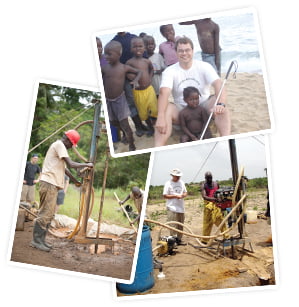Lifewater Canada Brings Clean Water to Numerous Villagers

Jim Gehrels, founder of Lifewater Canada, is legally blind, but he has a clear vision for meeting basic human needs. He has a mission to provide clean water to people who need it most. With the help of the organization’s network of volunteers and Lone Star Drills, he’s doing just that.
In 1993, this hydrogeologist joined Lifewater International on a drilling mission in Kenya. During the trip, Gehrels discovered Lone Star Drills, a line of portable water well drills designed to meet the portability and operational challenges in underdeveloped countries. The trip led Gehrels to start his own nonprofit just two years later. He named it Lifewater Canada, an organization now run by professional well drillers, hydrogeologists, environmental specialists and nurses who volunteer their time and energy.
Gehrels’ first well-drilling journey was to Liberia, where piped water had been cut off since the civil war. Residents were drinking out of gutters, salty swamps and shallow holes. A slew of volunteers worked hand-in-hand with a new LS100 drill developing wells on the major street intersections and common market locations. This drilling success led to a long-term partnership between Lifewater Canada and Little Beaver.
The nonprofit now owns several Lone Star Drills that are used in Kenya, Nigeria, Haiti and Liberia. They range from the LS100, which is ideal for everyone from beginning drilling crews to experienced operators thanks to its simple operation and easy maintenance, to the LS350, which Little Beaver specially designed for Lifewater Canada’s unique missions. The portable rigs are durable and easy to transport to rural areas. In the case of the LS100, the rig is compact and light enough to be carried over rope bridges, yet it still provides enough torque to drill through sandy soils and clay. The LS350 can drill wells to depths of 300 feet and can be coupled with a down-the-hole hammer to power through medium to hard rock formations.
Designated leaders in Liberia, Haiti, Kenya or Nigeria can contact Little Beaver at any time and the company will ship whatever is needed to repair drilling rigs. Joe Haynes, owner of Little Beaver, has even paid his own way to travel to Africa to see the equipment in action and provide on-site modifications as needed. Gehrels says Little Beaver has provided the “ultimate in customer service.”
Lone Star Drills also come with equipment to do all related aspects of bringing water to people who need it. Lifewater teams are equipped with mud pumps, hydraulic power units and other drilling accessories, including drill bits and drill pipes. Little Beaver will supply every possible tool that workers may need while drilling, even if the company doesn’t manufacture the items. “Little Beaver has gone beyond the call of duty to ensure we have everything we need to use the machines effectively. That is a critical factor when drilling in extreme conditions far from home,” Gehrels said.
It’s the kind of reliable backing Lifewater Canada needs to improve lives, one well at a time. “Every time clean water starts to come out of our wells for the first time it’s like a miracle,” Gehrels said. “You see this water turn from murky brown to crystal clear. People begin dancing and celebrating. Their joy is contagious and a reaffirmation of all the work that we’re doing.”
So far, Lifewater Canada volunteers and local people have drilled 700 wells with the help of Lone Star Drills. They’ve improved life for thousands already, and the work continues thanks to Gehrels’ vision for a safer, healthier future.